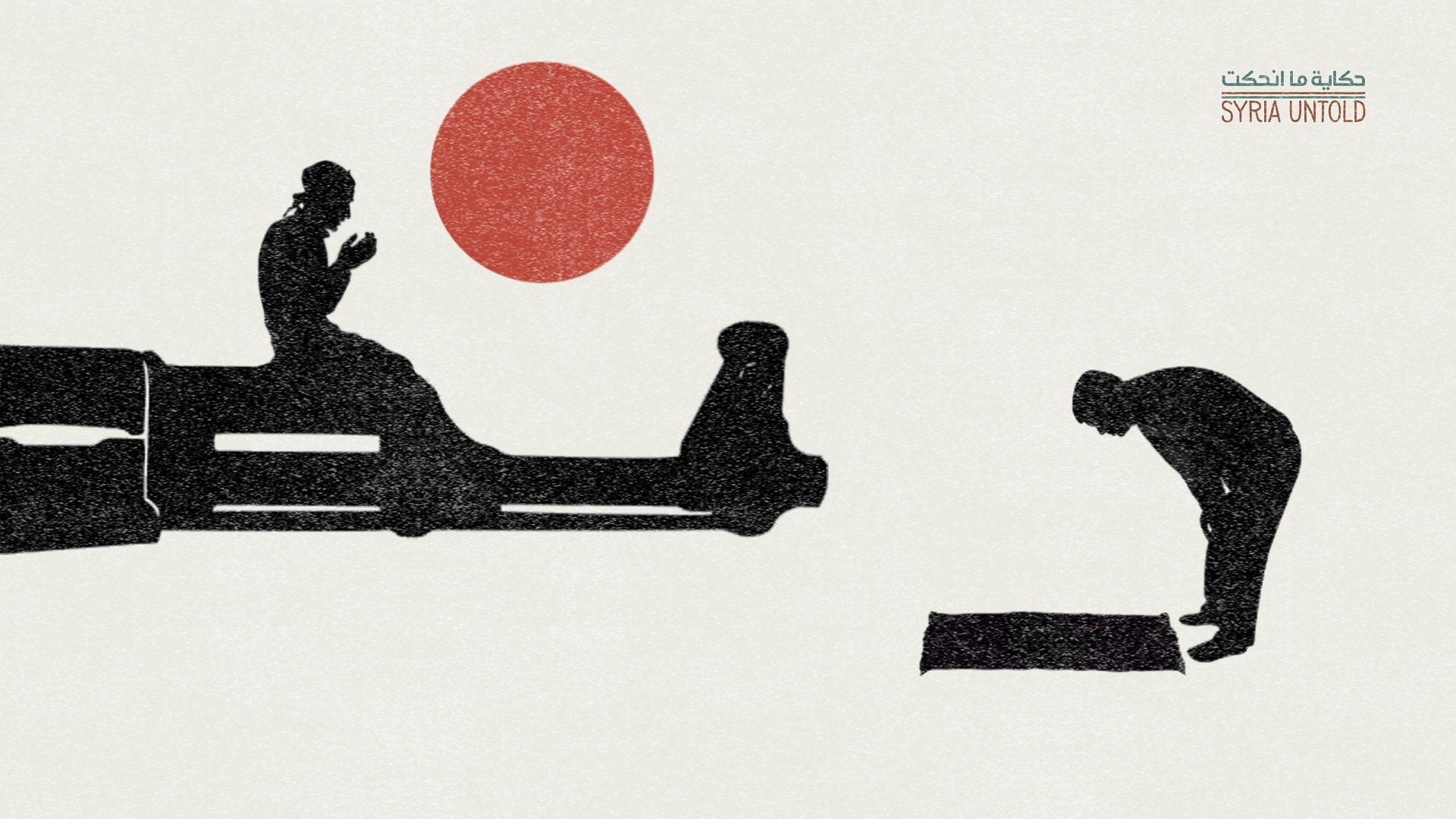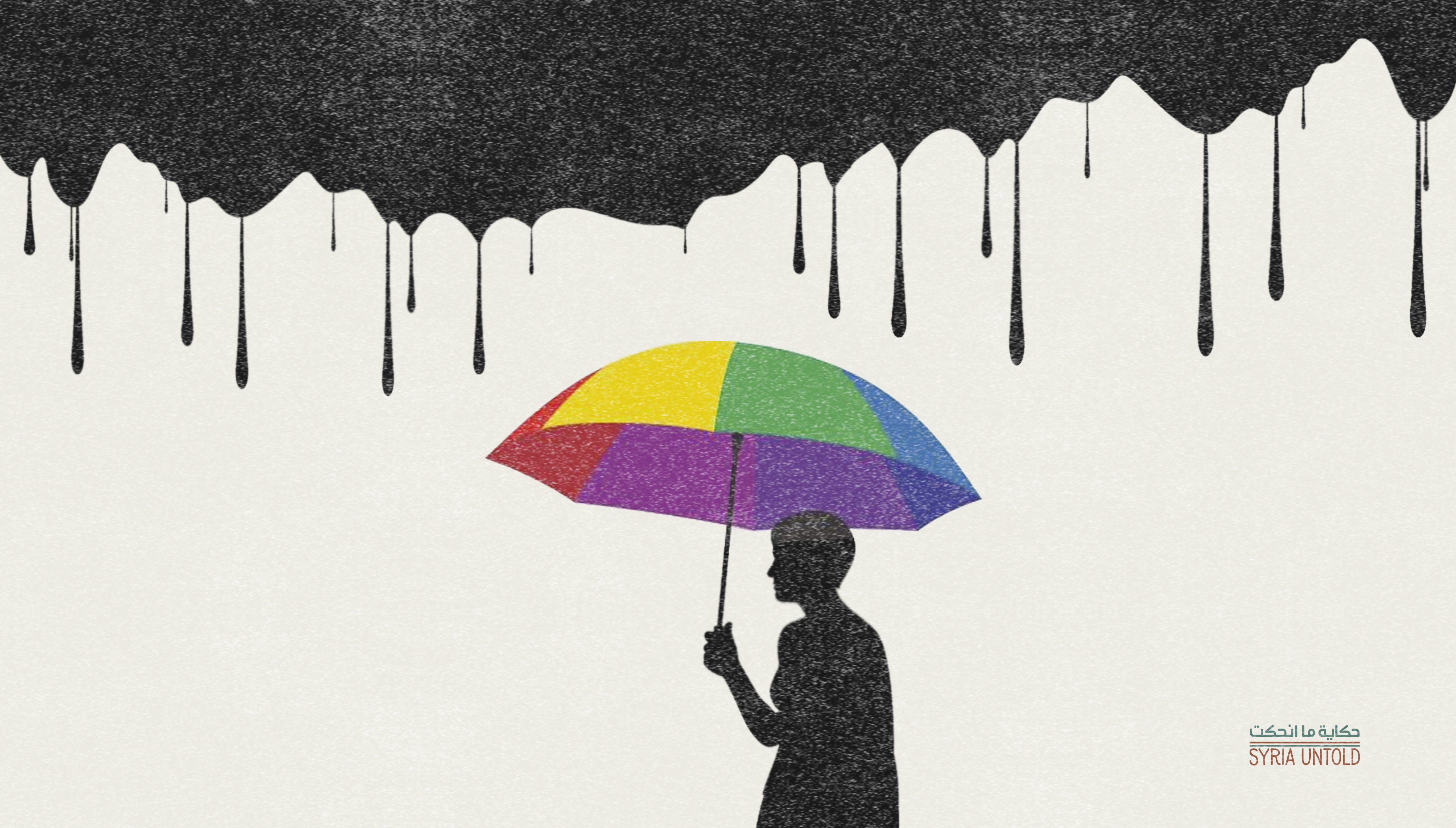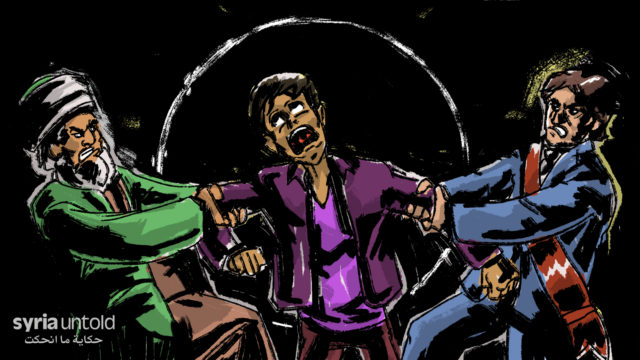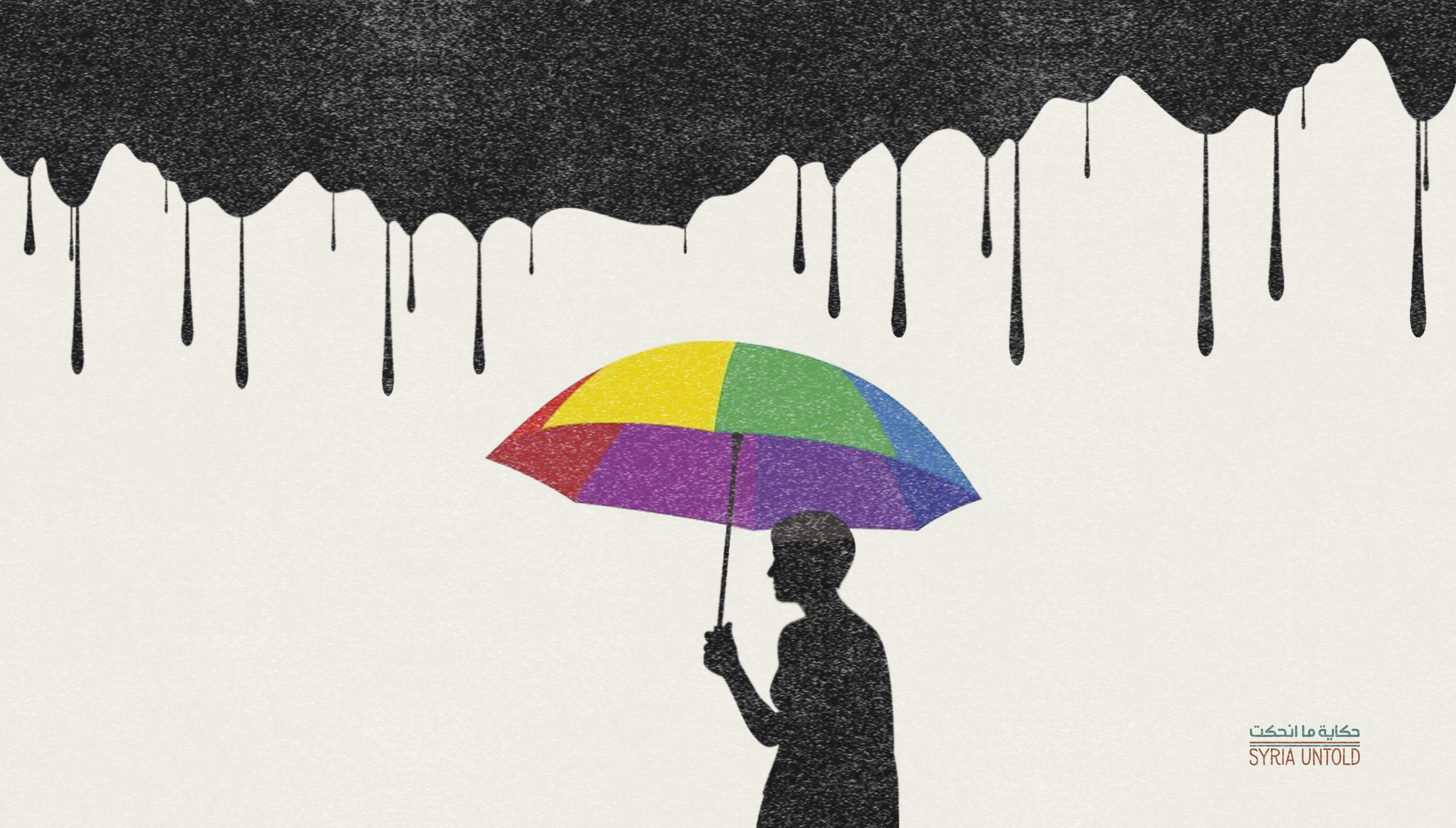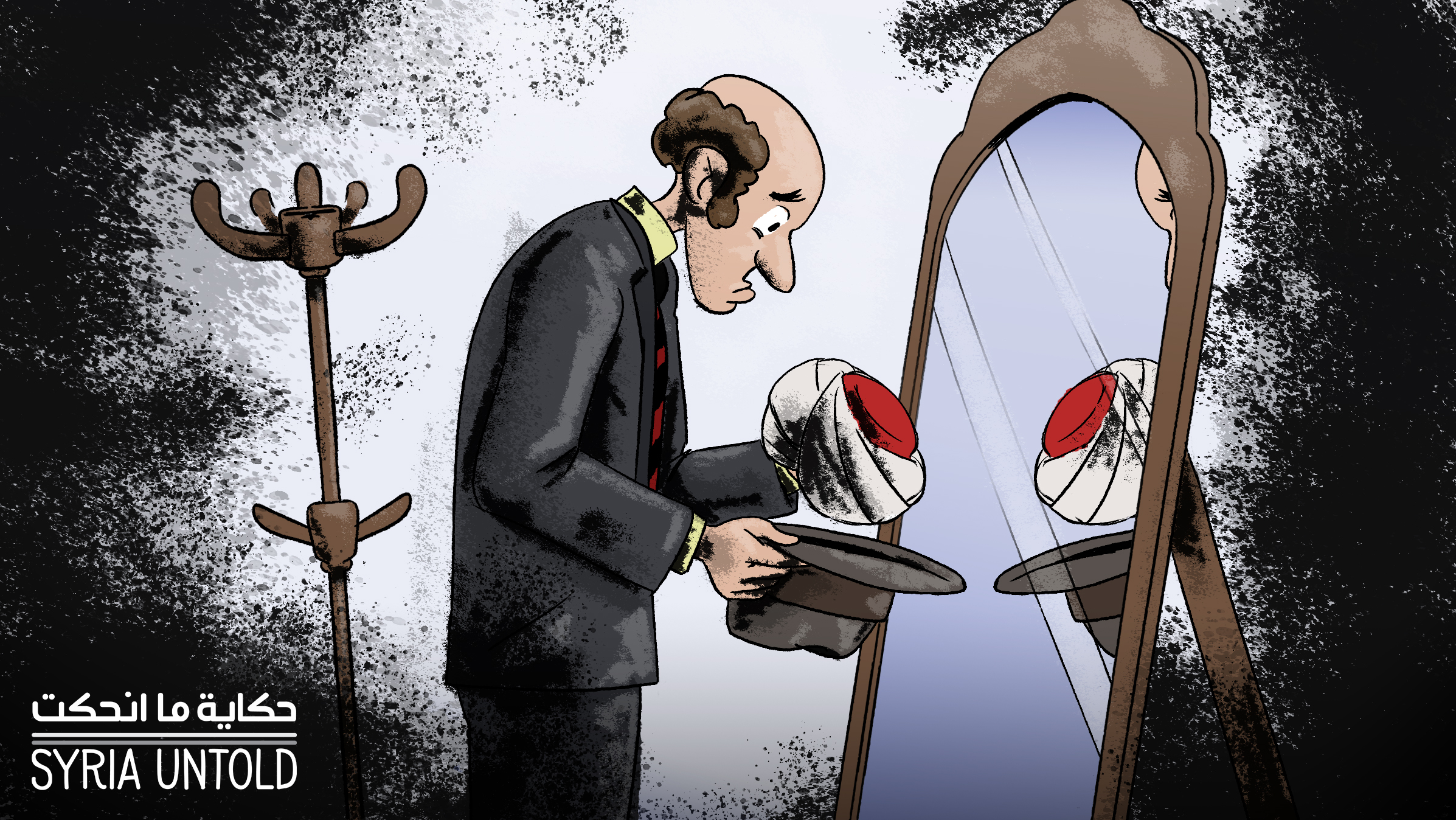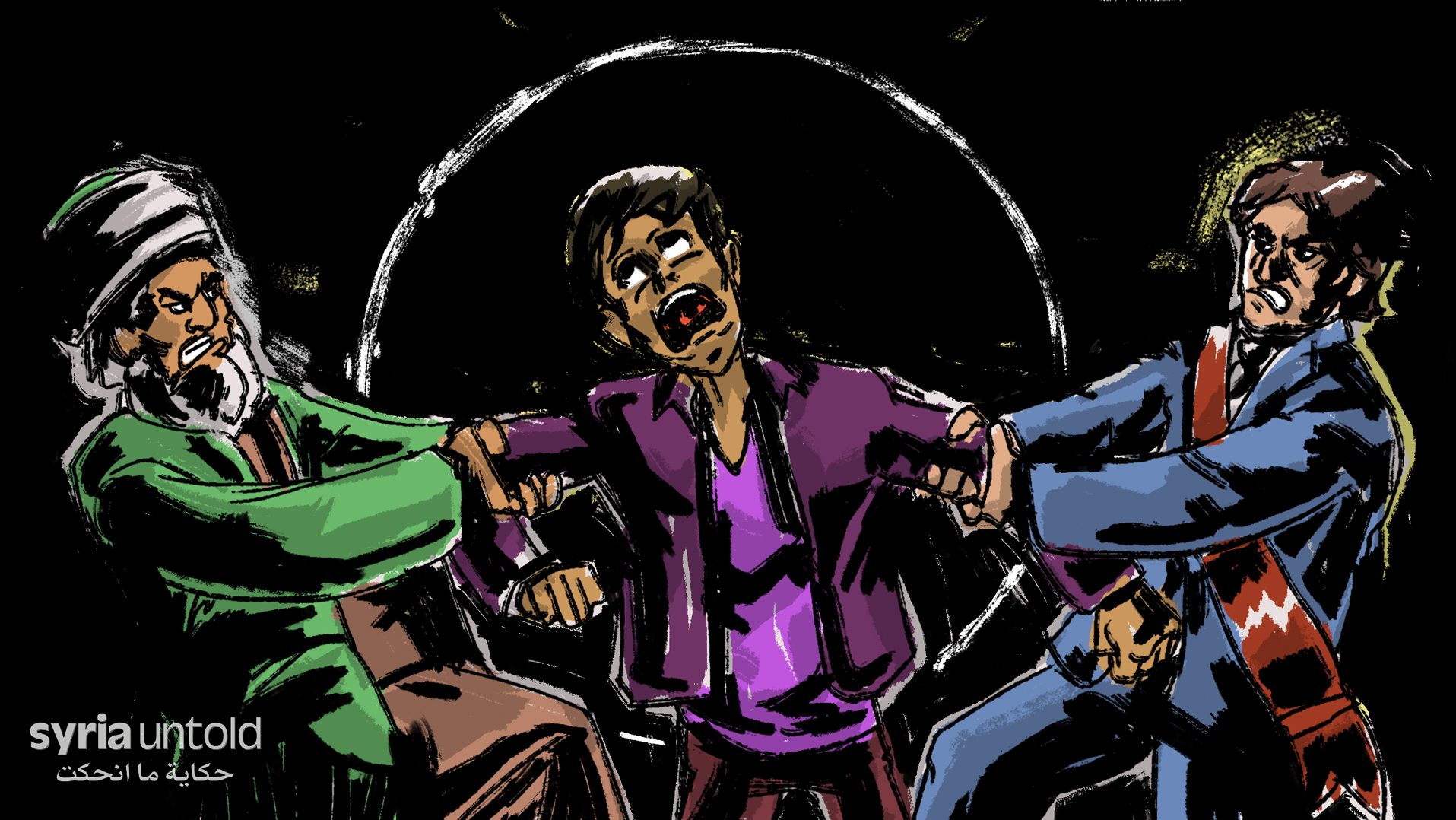This article is published as part of the “Prospects of Secularism in Syria” series in collaboration with Salon Syria and Jadaliyya. The full series in Arabic can also be found here.
There's been a great deal of confusion and distortion that overshadowed society regarding the concept of secularism, as it has been considered the antithesis of religion, tantamount to blasphemy and atheism. This is a deliberate distortion—one that the Ba‘athist era contributed to, as the Ba’athists lay claim to secularism through despotic methods and exclusionary positions hostile to religion, faith and believers, just as they are also hostile to those not under its banner, in the vein of totalitarian, communist and despotic regimes.
This Ba’athist era extended for almost five decades, during which time the state asserted a monopoly over public affairs and political action. The regime also monopolized the economy and the country’s wealth. It fenced itself off with security apparatuses and an ideological army that adopted the ideology of the leading party, which gradually replaced loyalty to the nation or its citizens’ rights. It also domesticated all manifestations of civil society and trade unions, which became affiliated to the National Security Bureau under the Ba‘ath Party and the leader of the state.
Regimes that lay claim to secularism
Nevertheless, these regimes that lay claim to secularism never hesitated in using religious and national exceptionalism to take advantage of the religious emotions of the Muslim public as tools in their conflict with political Islam. So, we had Anwar a-Sadat, the faithful president in Egypt. Saddam Hussein added "Allahu Akbar” (God is great) to the Iraqi flag in 1991. And the Assad regime oversaw a huge surge in mosque construction, in addition to the establishment of state-linked Assad Institutes for the Memorization of the Qur’an. Most importantly, these supposedly progressive and secular regimes were keen—through all the various constitutions they produced—to stipulate in their own different ways that the “religion of the head of the state is Islam” and that “Islamic shari ‘a is the main source of legislation.”
This pragmatism insists that the authorities in power consort with the crowd of popular Islam through fatwa, endowment institutions and preachers, and by bribing this crowd with sloganeering, the construction of new mosques and allowing some of them to leave their jobs for an hour or so each day under the pretext of noon prayers!
On the other hand, this pragmatism saw no fault in consorting with some secular intellectuals and forces in their societies, motivated by the need to respond to western pressures or demands of international organizations to modernize laws concerning public freedoms and human rights—especially the rights of women and children.
Related articles
18 August 2018
Syrian secularists, and moreover the concept of secularism, are under attack online and on the ground. Joseph Daher takes a critical look at recent efforts to discredit the contribution of...
Reforms that never came to light
In this context, I worked with a legal team who worked with the Syrian Commission for Family Affairs, which was established by Decree 42 for the year 2003, with the aim of modernizing the legal and constitutional structure of the state. I was granted the right to work on amending all legislation with the aim of promoting gender equality.
We practically completed the Syrian Child Rights Law and the Parties and Associations in Syria Law. We were going to develop a modern family law as an alternative to the Civil Status Law. The completed laws were discussed with a group of Syrian legal experts and then with representatives of the European Union and international organizations in Damascus. These draft laws were then sent to the competent authorities for discussion and endorsement. However, they went into drawers somewhere in government offices and never re-emerged.
This renaissance was not meant to last for long. The portfolio of modernizing and developing Syria's legal infrastructure was quickly closed, especially with regards to the civil status law and women’s and children’s rights. Moreover, a new civil status draft law was presented in 2009 that reflected a fundamental tendency, more backward and discriminatory, and which violated women's rights. This irritated most Syrian intellectuals, so they went in to discussions about how to refute it, and eventually succeeded in preventing it from being passed.
In an atmosphere of Ba’athist, militaristic tyranny, as well as the absence of the state in functions such as service provision, development and providing security to its citizens, various segments of society began to retreat into pre-modern societal and ideological structures: be they family, clans and tribes; sect or regionalism. This constituted a suitable atmosphere for the revival of all forms of religiosity in Syrian society—from Sufism to Salafism, and all the way to political Islam and jihadist movements, which the regime directed toward its historical rival in Iraq’s Ba’athist regime. However, they they rebounded against the regime itself after the eruption of the Syrian uprising in 2011.
Also, within the context of this uprising, a great number of religious, sectarian, tribal, clan and ethnic affiliations emerged, which Ba‘athist tyranny had denied existence to before the statues began to fall. Therefore, we can say that this spring, despite its current repercussions, has succeeded in exposing bipolar Ba‘athist and religious tyrannies. The former defended its survival by creating sectarian, ethnic and regional polarization, resorting to countries and militias that contributed to the destruction of the country, society and state structures. Political Islam and its historically outdated powers went in the same direction, reversing only the orientation as they adopted sectarian and divisive rhetoric, resorting to more backward and brutal powers that contributed to the destruction of Syria and the killing and displacement of Syrians.
The problem of political Islam
The problem of political Islam is that it refuses to separate the domains of faith and worship on the one hand, and state affairs on the other. It considers that Islam not only covers faith, but also regulates the affairs of people in regards to food, clothing and interactions between people. Its preachers add that during the time of the Islamic caliphate, the caliph or sultan was entrusted with both religious and political powers. Thus, he was both the ruler and imam at the same time. According to these preachers, this is contrary to the norms of other monotheistic religions. That is why they insist on the slogan “Islam is the solution,” ignoring changes over time and the needs of modern times on the one hand, and the problem of plurality and divisions between religions, and even within the same religion, on the other.
This explains radical Islamist discourse’s animosity towards secularism. Islamists want to alienate moderate, popular Islam from secularism, and away from intellectuals and social and political powers who call for it. Islamist discourse considers secularism as blasphemy and libertinism, a departure from the shari‘a and inherited traditions of our conservative societies, and even an act of sabotage that destabilises those same traditions and societies.
Anyone who follows the conflict between Syria’s military and religious tyrannies will discover that it is a conflict of interest, and that it was never about religion and secularism. This contributed to the formation of a simplistic ideological polarization that left Syrians, and even segments of the intellectual, political and civil circles, caught in a bipolar tyranny. This hindered the development and modernization of society because of the need for an atmosphere of freedom and democracy—including the freedom of faith and freedom to exercise religious rituals and rites, which no religious state can provide.
Religious states throughout history have been tyrannical by necessity because they exclude other religions from the state’s political sphere, which they monopolize—as we see in Israel, for example—not to mention the fact that religions generally, and Islam particularly, are historically divided into doctrines and sects, which would be excluded or persecuted in any religious state. This is the case in the mullahs’ regime in Iran.
So how do we get out of this impasse?
Sheikh Ali Abdul Razzaq tried to address this issue in his book Islam and Origins of Rule (1925). He rejected the notion of Islamic rule, adding that “Islam is a message not a rule. It is a religion, not a state.” He also argued that the “caliphate is a religious system, the Qur'an did not demand it or refer to it,” adding that “Islam is innocent of the caliphate system.”
Therefore, we need alternatives for the religious caliphate state, which divides society rather than unites it, destroys the economy and does not promote development, while standing against modernity and history. We need a modern state that adopts the principle of secularism and a pluralistic democratic system, which ends the era of tyranny, stops ongoing wars and fighting, and unites all citizens under the constitution and law, rendering them a people capable of making their own future.
Towards a democratic system rooted in secularism
Secularism is a philosophical, social and political system based on the principle of separating religion from the state, without being against religion or faith. It should not be linked to the state, because the state in modern political thought is a nominal entity—like any other administrational institution—in which residents can believe in a religion or religions, or not believe in anything. The state has to be neutral toward all religions and toward the various sects and beliefs of its citizens.
With a quick look at western countries, which adopt the principle of secularism in their constitutions, and despite many lapses, one can see that these states maintained their neutrality toward religion or religions in general, without hostility or being against them. Secular states respect all religions and protect them because of their democratic nature. They respect all religious people in all their variations and denominations and defend their right to believe and exercise their rituals and rites, and they also respect those who reject religion. However, they prevent encroachment by any religion or religious people into the public sphere of state business, which has no religion.
As Syrians, from a country which for many years witnessed wars over its land and the settling of regional and international scores, and after nearly half the population became internally displaced or refugees, we are now in desperate need of a powerful force to restore the unity of Syrians lost due to military and religious tyrannies, neither of which seem capable of achieving this unity now or in the future.
Related articles
21 August 2018
Syrian secularists are under attack online and on the ground. Joseph Daher takes a critical look at recent efforts to discredit the contribution of Syrian secularists to the 2011 revolution...
That's why there must be a democratic system rooted in the principle of secularism as the only possible solution. It is a historical necessity for any national and democratic project for Syria’s future: a project for a non-religious state with a social contract for all its citizens. This social contract is what unites all citizens in the state under the constitution and law and makes them a people—regardless of their beliefs and sects.
History provides us with the best proof. Western Christianity went through various bloody conflicts and sectarian divisions that began with the religious reform led by Martin Luther in 1517. Millions of Europeans paid for these divisions with their lives until the Holy Roman Empire signed the Peace of Westphalia in 1648, thereby ending the era of religious wars between the Protestants and Catholics.
The importance of this peace is that it established a new system in Europe based on the independence of each state within its territorial borders—translating to the administrative and political sovereignty of states within their geographical borders, as opposed to the sovereignty of the church, which had no border. In other words, it was the separation of the religious institution from the state institution, but not by abolishing religion or fighting it. This consequently allowed the development of systems of governance, administration and economy away from the dominance of religious texts, or the interests of the church.
Unfortunately, Islamic societies have not been through this same era of religious reform. The decline of the Ottoman Empire encouraged European colonialism to take up its legacy in the region. Subsequent independence regimes did not achieve any societal and democratic development in the structures of the state. Successive military coups in Syria contributed to the transition toward Ba‘athist tyranny and the one-party dictatorship, which produced a catastrophic failure on all levels.
It is a sad paradox that in Syria—and the region in general—five hundred years after the religious reform of Christianity in Europe, we are going back to the worst versions of the Islamic caliphate. This was manifested by the rise of the Islamic State in Iraq and Syria (or ISIS), which led to the destruction of politics and economics, administration and civil society. The group showed utter contempt for the essence of the faith when it brought people back to the nomadism of the desert, and the ignorance of princes and clerics who beheaded people, capturing women and selling them in slave markets, and conspiring against the people in the name of religion and god.
This produced the current historical failure of political Islam, which stands in contrast to the world, history as well as people's own interests.
Yes, the reality is dire. But there is no other way to improve it than through a national democratic project that adopts secularism as a constitutional framework to build the state.
